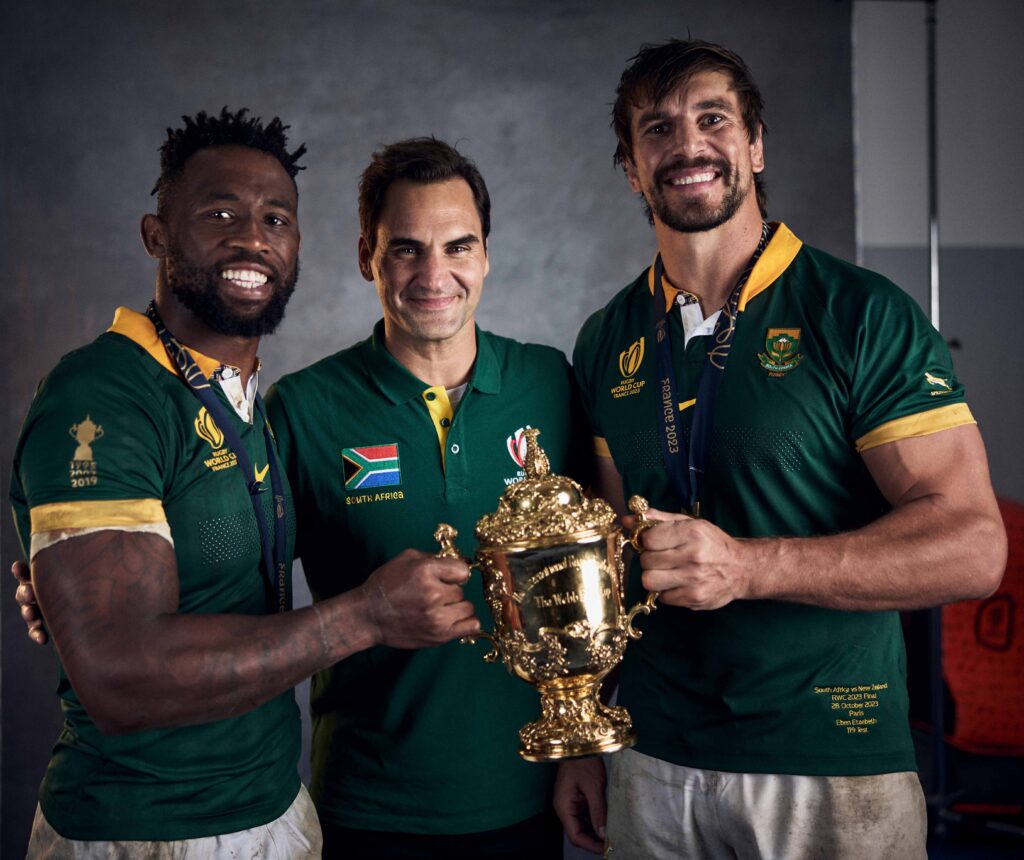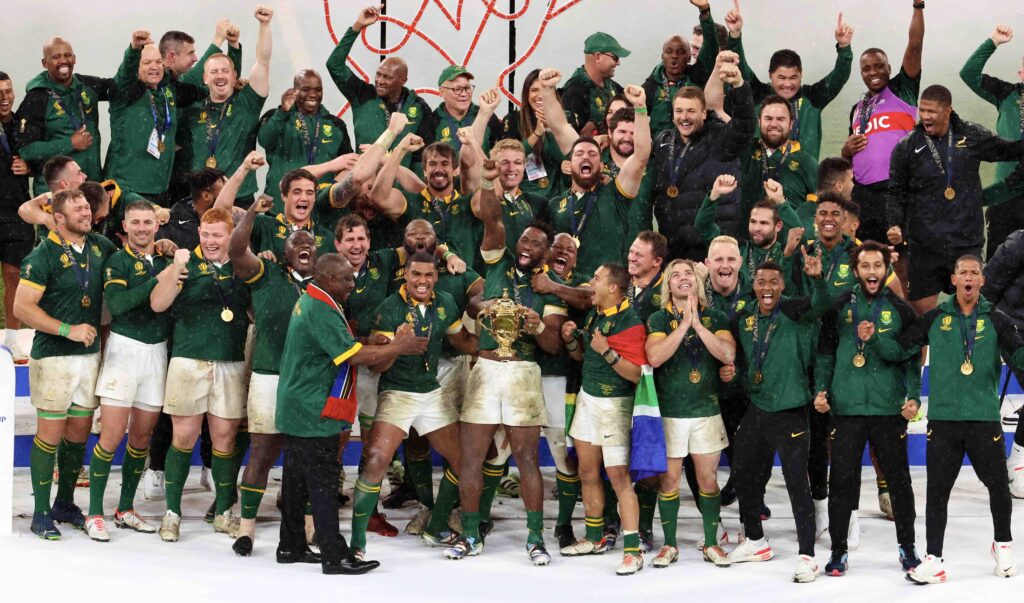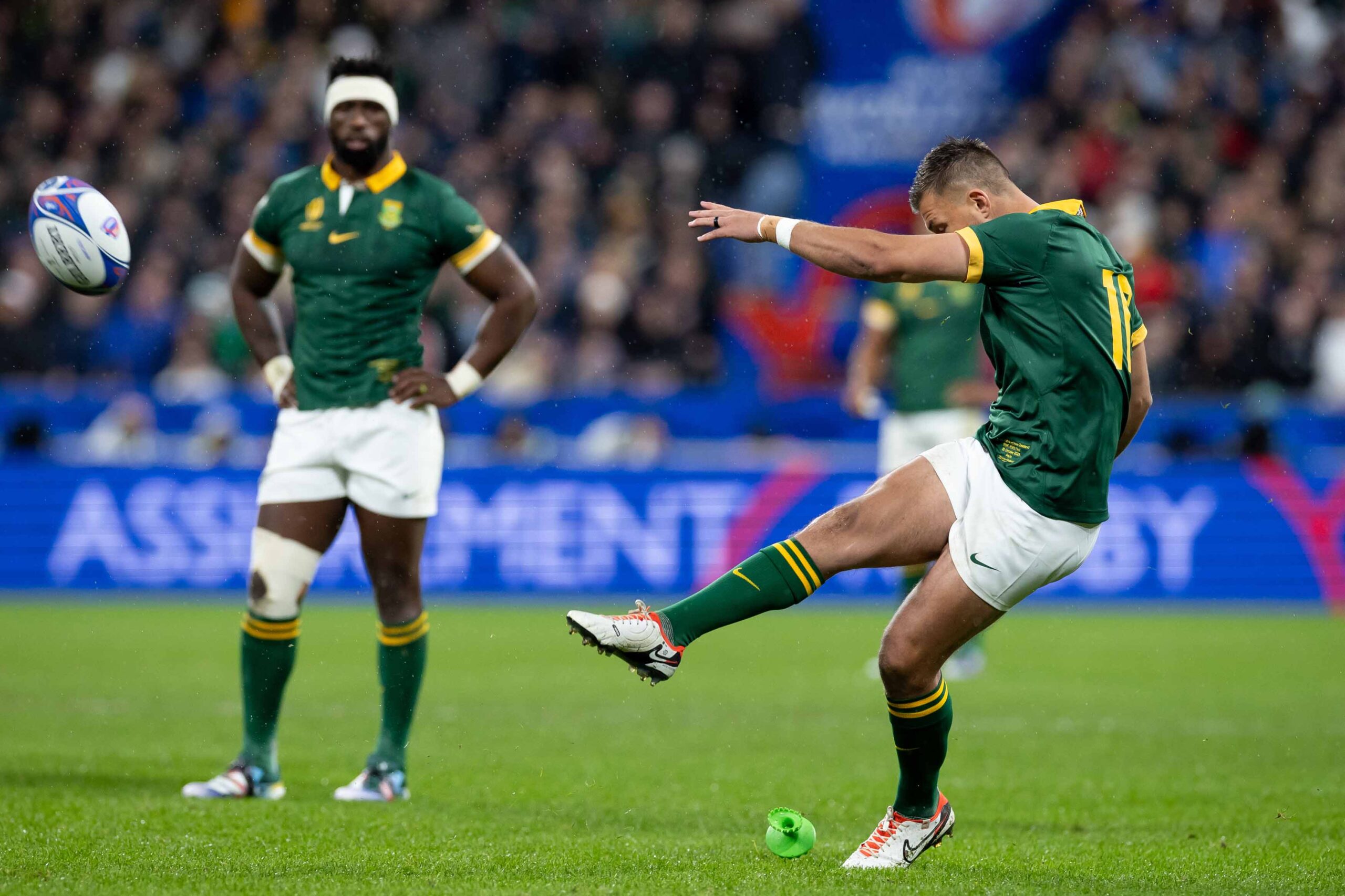The Springboks returned home having defended their Rugby World Cup title successfully. They are only the second team to do that and the first nation to win four World Cup titles. While the dust settles on that magnificent night in Paris and players start returning to their clubs, we look at how this feat was achieved with particular focus on the captain, the gladiator, Siya Kolisi, writes Ralph Staniforth
The 2019 Rugby World Cup victory was huge for South Africa as it ignited a spirit among South Africans much like the 1995 and 2007 victorious Springboks did. But it would be tough to argue that the 2023 victory hit a different level of emotion in South Africa.
This could be seen in the weeklong Springbok roadshow following their victory over our rival All Blacks in Paris. No doubt battered and bruised, the Boks put on a show for the vast crowds across each city and township they entered.
Various heartwarming videos and images flooded the social media sites as South Africans got to say thank you to the Springboks, and yes, the Springboks got to say thank you for the incredible support it received throughout the tournament.
It is hard to explain how or why, but the 2023 victory certainly made a greater impact. Or perhaps it is not that hard to explain because the team, the coaches and the Springbok brand has bonded with the public like it never has before.
But we have to go back to 2018 when this bond really started to form. It was a slow start, subconsciously perhaps, but the moment Siyamthanda Kolisi was named as Springbok captain, bonds started to form. It was certainly not easy in the beginning; nothing ever is in South Africa.
South African rugby was in a dark space when Rassie Erasmus was announced as head coach of the Springboks in 2018. But Erasmus had been involved in SA Rugby for many years within provincial/franchise coaching roles as well as analyst for the Springboks in 2011.
However, perhaps Erasmus’ most important role up to that point was setting up the Elite Player Development (EPD) pathway which didn’t just focus on underprivileged players or areas, but it was a focal point. This is something he doesn’t get enough credit for.

Rassie, as he is affectionately known, is and always has been a man of action. If you have read his book, it is clear the struggles he fought as a youngster. He had a history, long before his role with the Springboks, of fighting against coaches who were anti-transformation.
Looking back now it is easy to see, but perhaps it was not as easy to see at the time. Rassie didn’t just change the fortunes of the team on the field, he changed perceptions of the entire brand of the Springboks.
There was no hesitation in his first interview when he made it clear that transformation would take place. It won’t need to be forced because there was more than enough talent within the setup for him to make it happen.
Rassie then went on to make Siya Kolisi captain of the Springboks. This struck a chord with many, not all of it a very good chord. As Rassie himself said, he lost friends who accused him of playing to his paymasters.
Wouldn’t we love to see the reactions of those people now? We now consider it a masterstroke by the former Cheetahs and Springbok flanker, but even Rassie didn’t know it would all work out quite so well in 2018.
The Springboks have always had the ability to unite the nation, it did this in 1995, 2007 and 2019. And again in 2023, but more importantly, this time a far more difficult thing was achieved —the change of perception.
Leader of the Economic Freedom Fighters (EFF), Julius Malema, is not wrong when he says the Springbok was a symbol of apartheid. Rugby was seen as an Afrikaner sport, played by Afrikaners. At least at national level.
But the sport was always a big hit throughout the apartheid years in communities of the marginalised. All you have to do is speak to people from those communities and their rugby heroes from the 60s, 70s and 80s were not Springbok players, although more than good enough to have played on the international stage.
Yet, there is a difference. The Springbok emblem, name and brand can change meaning. It is a moving entity and with the rise of the last five years, the Springbok emblem is a great symbol of what South Africa can be.
It is a sign that things can change, that people can change, and can change their perception as long as that thing is representative of the people of South Africa. It is a message of hope that South Africa needs.
It brings us to the ‘Stronger Together’ slogan of the Springboks. It is no secret that Rassie and the rest of the coaching staff has tapped into each individual’s strength since taking over the reins of the green and gold. It can be seen throughout the documentary ‘Chasing the Sun’ that was made following the 2019 success in Japan.
There are emotional moments throughout, moments that brought tears to many eyes across South Africa and globally. We all got to see the hardships players faced, specifically those who made it against all the odds.
It is a uniquely South African tale, there are very few, if any tier one rugby nations that face half the challenges South Africans face on a daily basis.
Throughout the tenure of Rassie and now former Springbok coach, Jacques Nienaber, they have made it clear that the players play for South Africa, each and every citizen. They know that the team cannot bring about change to every South Africans life, or affect government policy, but they can represent the spirit of the nation and give them 80 minutes on a Saturday to enjoy…and a roadshow of epic proportions.
That brings us to the 2023 Rugby World Cup. How exactly did the Springboks win what was undoubtedly the toughest run anyone has ever had at the showpiece event? The Springboks can now also claim to be the greatest Rugby World Cup team of all time, having won four titles in their eight tournaments to date.
The World Cup draw was made three years in advance due to the COVID-19 pandemic which resulted in a lobsided draw. It saw South Africa drawn alongside Ireland and Scotland, all three in the top five ranked sides in the game.
Getting out of the pool was already a tough ask but after the comfortable opening victory over Scotland, it was always in their hands. Despite suffering a five-point defeat to Ireland, the Springboks qualified in second place and had to face tournament favourites and hosts, France.
No matter what anyone says, this was always going to be the toughest game of the tournament. A raucous crowd packed the Stade de France with the vast majority supporting the hosts.
It turned out to be an incredible game, probably one of the best seen in the sport oveer the last 30 years. Handre Pollard, who didn’t make the squad initially, nailed the crucial penalty from inside his half to land a one-point victory.
That game took its toll on the Springboks, both physically and emotionally. It was clear the following week against England, who came into the tournament in horrid form but found a good level of performance during the tournament.
The English led from start to finish, well, not quite the finish, but for 78 minutes at least. The men in green and gold looked all but out of it, nine points down with less than a quarter of the game to go.
But as they have done so often, Siya’s men rose against adversity and scored a crucial try. It was followed by another last-gasp long-range penalty from Handre Pollard to seal another one-point victory.
Onto the final the Boks marched where they were to face archrivals, the All Blacks. This is perhaps the biggest game in Rugby Union, and it just happened to be a World Cup final as well.
Unlike previous games, the Springboks made a strong start to the game, dominating the opening 40 minutes, but they could only land four penalty kicks through Pollard. 12-6 at the break with the All Blacks down to 14 men after Sam Cane saw red.
Was the game in the bag? Many would have thought so, a strong performance in the opening stanza and now a man up for the next 40. But anyone who thought the All Blacks would lie down and just take the defeat on the chin, has not watched the All Blacks since the game turned professional.
Tactically New Zealand were superb in the second half, pressuring South Africa into uncharacteristic errors. It eventually led to New Zealand scoring the only try of the game, but crucially, Richie Mo’unga’s conversion sailed wide. 12-11 it remained.
Jordie Barrett then missed a long-range penalty which would have put the All Blacks into the lead, and even after missing, it looked like the Springboks were going to fold under the pressure. But they didn’t, they kept going, kept making big hits and coming up with big plays at crucial times. When Jasper Wiese picked the ball up from the back of an under-pressure scrum, he held on for dear life and it proved to be enough. Ball unplayable, game over!
The sound of Wayne Barnes’ final whistle sent South Africans into delirium. The rest of the squad stormed the pitch, Paris erupted, and every pub, household and mall across South Africa turned into a raucous celebration.
Almost immediately social media sites were flooded with videos people dancing the streets of various cities across the country. Singing the national anthem or some other rugby related song, it didn’t really matter, the Springboks had somehow managed to concur a run of games which for many would have seemed insurmountable.
Celebrations didn’t stop on Saturday night, they continued throughout Sunday when very sore heads were ignored to honour what the Springboks had done. Later the following week the side was welcomed by thousands of supporters at OR Tambo International Airport in Johannesburg. It was a welcome that brought Rassie Erasmus to tears – this is exactly what he wanted to achieve when he took the job in 2018.
It would be amiss of us to not go back to the World Cup though. We will shout from the rooftops that we are the best side in the world, and who can argue with us? But the Springboks were second best for much of the quarter and semi-final against France and England.
The Springboks were very good against France, let’s get that right straight right off the bat. But France is an exceptional team and properly pitched up on the night. But three one-point victories says something about what has been built in this Springboks squad.
We have a very diverse squad with players from very different walks of life. But for five years they have been learning about each other, the struggles each has faced in their career and bonds have been built. Bonds that will last long after retirement has come for these players.
That has allowed trust to build within the squad, which has been proven numerous times over the last two World Cup cycles. Rassie is big on the word ego, it is something he doesn’t allow within the squad, this is why he is meticulous with players he selects. The best (according to fans) is often not selected because the character of the player plays a bigger role than the talent at times. Understanding who you play for and what needs to be done within the Springbok setup is key to the coaching staff. And the players have taken that onboard.
In those tight knockout games, all this came to the fore. We were up against 80 000 French supporters in the quarter-final and still managed to score at the crucial times. Handre Pollard, who was not in the original squad and only joined one Malcolm Marx got injured kicked 11 out of 11 across his four games.
Manie Libbok played exceptionally well throughout the tournament, but his goal kicking was a cause for concern. Once the conditions didn’t favour him in the semi-final against England, Nienaber had little hesitation in replacing him well before half time. Pollard then started the final.
But, unless there is full trust within the squad and coaching staff, decisions like that can often cause huge discontent. Instead, in the Springbok setup, it is accepted that the best person for the job on a specific day is selected.
This trust has been earned by the coaches who have backed players and continued to give them opportunities. So much so that Pollard and Lukhanyo Am didn’t make the initial squad despite the coaches knowing they will both be fit during the knockout stage.
We can heap praise on the coaching staff, on Pollard for nailing all the crucial kicks and on every try-scorer during the tournament, but the glue that keeps this all together is Siya Kolisi.
From a captaincy point of view, Siya was raw in 2018. And he freely admits how much he leaned and continues to lean on other experienced players. Over five years he has however grown immensely as a leader, he is not simply a hero to South Africans, he is globally admired by his peers.
Every time Kolisi steps on the podium after a game he comes away with plaudits, whether the Springboks have won or lost. It is because he doesn’t lead with an ego, he leads with understanding, empathy and courage.
Kolisi understands his country, he knows what poverty is, he knows what it took him to get where he is today. He is so much more than the Springbok rugby captain; he is an idol, and an example of what South Africa can be.
Under Kolisi this Springbok side has become only the second team to defend their title and the first team to win four Rugby World Cup titles. While it is apt for this Springbok side to be remembered as among the best in the sport, Kolisi should be remembered as so much more.
From Zwide in the Eastern Cape, Kolisi has risen to be the greatest Springbok captain of all time. He, however, should be remembered as a man who transcends the sport of Rugby Union, and that would be the case even if he didn’t lift the William Webb Ellis trophy for a second time.
Ralph Staniforth is the Production Editor of Leadership Magazine


